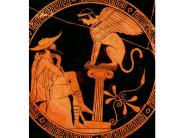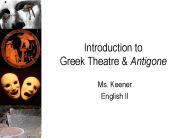Hamartia PowerPoint PPT Presentations
All Time
Recommended
Handling HIPAA Horrors - How to Handle the Hot-shots, Half-wits, and Hamartias ... 1930 1st appearance of the comic strip 'Blondie' ...
| PowerPoint PPT presentation | free to download
Def: When an object, person, situation, etc, is used to represent another object, ... What is Odysseus' hamartia? Hamartia: Odysseus = pride = men ...
| PowerPoint PPT presentation | free to view
Father of Antigone, gouges his eyes out after learning of his ... Hubris. Aristotle's term for 'tragic flaw' Hamartia. Reversal of fortune. Peripeteia ' ...
| PowerPoint PPT presentation | free to view
Setting of play: Wittenberg University in Germany and various location sin Europe ... Hamartia (tragic flaw) Evidence of suffering. Evidence of enlightenment ...
| PowerPoint PPT presentation | free to view
The actors do not use 'The Method' Actors wear elaborate masks (You have a ... What happens when a good person finds out that, ... Hamartia. The ...
| PowerPoint PPT presentation | free to view
Died April, 23, 1616 and is buried in the Holy Trinity Church in Stratford ... ANAGNORISIS - the recognition. HAMARTIA - the error or flaw ...
| PowerPoint PPT presentation | free to view
Rather than defined through humour, defined through marriage. Therefore good rule of thumb Shakespeare's comedies will end in ... Aristotle called it hamartia ...
| PowerPoint PPT presentation | free to view
Hamartia 'tragic flaw' that usually takes. the form of ... Properties (Props) to be used. GREEK MASK OR PERSONA. Helped to identify the specific character ...
| PowerPoint PPT presentation | free to view
The Chorus, the citizens of Thebes, begs the gods for release ... Hamartia. Some Thematic Concepts. Freedom of will vs. Fate. Morality/immorality. A Question ...
| PowerPoint PPT presentation | free to view
Keep our hope fixed on seeing Jesus. Purify ourselves ... Sin, Gk hamartia 'to miss the mark' An archery term for missing the bull's-eye ...
| PowerPoint PPT presentation | free to view
A play in which the main characters experience various misfortunes and failures, ... has a tragic flaw: called 'hamartia' = 'missing the mark' ...
| PowerPoint PPT presentation | free to view
16 minutes ago - COPY LINK TO DOWNLOAD = pasirbintang3.blogspot.com/?klik=0140446362 | PDF/READ Poetics (Penguin Classics) | Essential reading for all students of Greek theatre and literature, and equally stimulating for anyone interested in literature In the Poetics, his near-contemporary account of classical Greek tragedy, Aristotle examine the dramatic elements of plot, character, language and spectacle that combine to produce pity and fear in the audience, and asks why we derive pleasure from this apparently painful process. Taking examples from the plays of Aeschylus, Sophocles and Euripides, the Poetics introduced into literary criticism such central concepts as mimesis ('imitation'), hamartia ('error') and katharsis, which have informed serious thinking about drama ever since. Aristotle explains how the most effective tragedies rely
| PowerPoint PPT presentation | free to download
Tragedy. Much critical analysis of tragedy is based on the Greek model of the tragic. One of the forerunners of defining ... In Greek this is known as HAMARTIA. ...
| PowerPoint PPT presentation | free to view
Poetics (Oxford World's Classics) | Download Here : gooread.fileunlimited.clubB00RP5PJVS
| PowerPoint PPT presentation | free to download
William Shakespeare s King Lear Date of Composition and Source Most difficult play to pin down Written after Hamlet and Othello Winter of 1605-1606 Leir a ...
| PowerPoint PPT presentation | free to download
Catharsis Catharsis is the audience s purging of emotions through pity and fear. The spectator is purged as a result of watching the hero fall.
| PowerPoint PPT presentation | free to view
Shakespearean Tragedy Structure and Conflict What is Tragedy? What is Tragedy? What s the difference between a Tragedy and a Sad Story? Origins of Tragedy The Greek ...
| PowerPoint PPT presentation | free to view
What is Tragedy? Origins of Tragedy The Greek philosopher Aristotle first defined tragedy in his book Poetics written in about 330 BCE Shakespearean Tragedy A Tragic ...
| PowerPoint PPT presentation | free to view
Hamlet as the Tragic Hero
| PowerPoint PPT presentation | free to download
Aristotle s Six Ingredients to Classical Tragedy 1. Nobility The individual involved has to be a member of upper nobility in order to be a tragic hero 2.
| PowerPoint PPT presentation | free to download
Tragedy & The Tragic Hero Aristotle defined tragedy as
| PowerPoint PPT presentation | free to download
A) Announce the approach, entrance, or departure of a character ... Never more than 3 characters on the stage at a time plus a 15 member Chorus ...
| PowerPoint PPT presentation | free to view
Oedipus The King By Sophocles Greek Theater Theater began as a festival honoring dionysus In Athens Well-attended Greek Entertainment Masks in Greek Theater Dionysus ...
| PowerPoint PPT presentation | free to view
Shakespearean Tragedy Structure and Conflict What is Tragedy? What is Tragedy? What s the difference between a Tragedy and a Sad Story? Origins of Tragedy The Greek ...
| PowerPoint PPT presentation | free to view
Characteristics of a Tragic Hero Aristotle s Tragic Hero Aristotle was one of the greatest philosophers of Ancient Greece. Aristotle used examples from the works of ...
| PowerPoint PPT presentation | free to download
Hamlet William Shakespeare Form of Shakespeare s Plays 5 Acts Act One Exposition Act Two Rising Action Act Three Turning Point comedy or tragedy Act Four ...
| PowerPoint PPT presentation | free to download
Jealousy Iago s jealousy of Othello (1.1) Othello s feelings of inferiority or seclusion (1.3) Othello s love for the pure Desdemona (1.3, 2.1) ...
| PowerPoint PPT presentation | free to view
DRAMA SHAKESPEAREAN TRAGEDY TRAGEDY Series of events which ends unhappily Suffering possibly followed by redemption Provides audience with a catharsis (emotional ...
| PowerPoint PPT presentation | free to view
Aristotle, Poetics 1453a This is the sort of man who is not pre-eminently ... An anagnorisis . . . is a change from ignorance to knowledge. ...
| PowerPoint PPT presentation | free to download
Title: PowerPoint Presentation Author: Heather Rene` Higgins Last modified by: Elementary/Secondary Schools Created Date: 10/5/2002 7:43:58 PM Document presentation ...
| PowerPoint PPT presentation | free to download
Oedipus Rex Sophocles
| PowerPoint PPT presentation | free to view
Aristotle s Traits of a Tragic Hero Common characteristics of a tragic hero according to Aristotle Basic Definition of Tragedy A drama in which a character (usually ...
| PowerPoint PPT presentation | free to view
Title: PowerPoint Presentation Author: Shari Hodges Last modified by: ACER Created Date: 1/21/2002 6:45:18 AM Document presentation format: On-screen Show (4:3)
| PowerPoint PPT presentation | free to view
The Tragic Hero What Julius Caesar, King Lear, Bill Clinton, and Michael Vick all have in common
| PowerPoint PPT presentation | free to view
Introduction to Greek Theatre & Antigone Ms. Keener English II Drama A story that is written and meant to be acted out in front of an audience Theater comes ...
| PowerPoint PPT presentation | free to download
Tragedy and the Tragic Hero Aristotle, the ancient Greek philosopher, identified the main characteristics of tragedy. He explained that tragedy is a representation of ...
| PowerPoint PPT presentation | free to view
... weakness of character or error in judgment which causes the downfall of the hero (usually hubris) hubris excessive pride; arrogance anagnorisis ...
| PowerPoint PPT presentation | free to view
ARISTOTELIAN THEORY English 9 Honors Greek Theatre Unit What is the ARISTOTELIAN THEORY of tragedy? In his Poetics, the philosopher Aristotle laid out the idea that ...
| PowerPoint PPT presentation | free to download
Euripides Medea Part 2 Recap and Update What Kind of Tragedy? Discussion Medea: Mother? Monster? Other? A Different Kind of Tragedy Lost in Translation?
| PowerPoint PPT presentation | free to view
Verbal: When a character says one thing but means another ... Dramatic: When the reader or viewer knows something that a character does ... Hubris, ambition...
| PowerPoint PPT presentation | free to view
c.) Introduced painted scenery. Euripides most modern of the Greeks ... Costumes -Bright -Colors played important role (ex: purple=royalty) Props -limited ...
| PowerPoint PPT presentation | free to view
Title: Oedipus the King part II Author: Andrew Scholtz Last modified by: Andrew Scholtz Created Date: 9/2/2000 7:31:07 PM Document presentation format
| PowerPoint PPT presentation | free to view
GREAT GREEK TRAGEDIANS AESCHYLUS (ca.525-456 B.C.) PowerPoint Presentation SOPHOCLES (ca.495-406 B.C.) EURIPIDES (c 480-406 B.C.) ...
| PowerPoint PPT presentation | free to download
Characteristics of Greek Theatre Performed for special occasions (Festivals to worship the Gods) Competitive- 3 playwrights competed, as did actors
| PowerPoint PPT presentation | free to download
Greek Terms. Anagnorisis. Greek: 'recognition'), in a literary work, the startling ... Aristotle introduced the term casually in the Poetics in describing the tragic ...
| PowerPoint PPT presentation | free to view
If you are in charge, you are allowed to be exempt from consequences. ... archetype. Four Qualities of Greek Drama. Performed for special occasions. Festivals ...
| PowerPoint PPT presentation | free to view
If you would like to donate SSR books, bring them in by your Final Exam Grammar Active/Passive Voice Modifiers Use of pronouns Sophomore Final Exam What to Prepare?
| PowerPoint PPT presentation | free to download
So what is a Tragic Hero anyway? Tragic Hero Background A man cannot become a hero until he can see the root of his own downfall. -Aristotle The tragic hero ...
| PowerPoint PPT presentation | free to download
Principles of Drama: Aristotle Tragedy Dr. Stephen Ogden BCIT Liberal Studies * Commentary on Drama PLATO (5th C. BC) The Republic: describes, from pure reason ...
| PowerPoint PPT presentation | free to view
Antigone and Greek Drama Notes Greek Drama Greek drama --honors Dionysos, the god of wine and fertility. Thespis (thespians) transformed hymns sung to gods into songs ...
| PowerPoint PPT presentation | free to view
Galatians Summary Outline Ch 1-2: Defense of Message and Messenger Ch 3-4: Grace-Faith versus Law-Works Ch 5-6: New Life in the Spirit Ch 5-6: New Life in the Spirit ...
| PowerPoint PPT presentation | free to view
Unit 1: Foundations of Drama Classical Tragedy According to Aristotle who first defined it using the Greek plays that were available to him, tragedy is: the ...
| PowerPoint PPT presentation | free to view
Elizabethan Drama What is a tragedy? Why do people write/watch tragedies? A Movement from Religious to Secular within the Theatre Previously, most of the drama done ...
| PowerPoint PPT presentation | free to view
Your response needs to be a paragraph in length. What differences do you notice between Antigone and her sister, Ismene? ... Ar te: inborn capacities ...
| PowerPoint PPT presentation | free to download
Othello William Shakespeare 1604 First performed November 1, 1604 for King James I. Written during Shakespeare s great tragic period (Hamlet, King Lear, Macbeth ...
| PowerPoint PPT presentation | free to view
Setting of play: Wittenberg University in Germany and various location sin Europe ... Drama loosened ties with church. Troupes would synthesize best of old and new ...
| PowerPoint PPT presentation | free to view












![READ [PDF] Poetics (Penguin Classics) PowerPoint PPT Presentation](https://s3.amazonaws.com/images.powershow.com/10091818.th0.jpg)











































